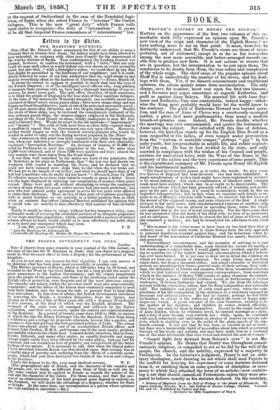rtittri to tip Ram
OUR MARITIME DEFENCES.
Sui—Had Mr. Disraeli alone announced the fact of our ability to man a Channel fleet in twenty-four hours, the fallacy might have been allowed to pass unheeded, in company with other jeux d'esprit for the amusement of the worthy electors of Bucks. Your contemporary the Leading Journal was pleased, however, to confirm his statement, with a "rider," that not only- could we man such afleet as would defend our own shores on every accessible point, but also that, "with a fortnight's notice, we could that up any fleet that might be assembled in the harbours of our neighbour; and it is confi- dently believed by sonic of our best authorities that we could steam in and destroy everything afloat in the harbour of Cherbourg."--Times, March 12. It seems too absurd to suppose it possible to throw dust into the eyes of the French Emperor ; or of the intelligent naval officers who, longpanting to measure their prowess with us, have had a thorough knowledge of our re- sources, for many years past. The only effect, therefore, of such assertions, is to blind the people of England to the true stateof their maritime defences. At the time of the memorable Wakwski despatch, our available naval force consisted of three* screw steam guard-ships; (five screw steam-ships and one frigate on Coast Guard.Service, (each at one of the principal mercantile pox ts) ; one 91-gun steam-ship (Renown), and two 32-gun steam-frigates. Besides the crews of these ships, may be reckoned the complements (reduced) of the four ordinary guard-ships, the seamen-riggers employed in the Dockyards, and those inn the Coast Guard on shore, totally inadequate to man Mr. Dis- raeli's Channel fleet. Would he resort the old methods—" impressment" and "bounty" ? The evils of both have been so often fully exposed that it is neediella to repeat that no Government can rely upon them. Moreover, neither would supply us with the trained seamen-gunners who would be needed in order to carry out the daring services proposed by the Times.
Our weakness on this point was fully exposed to our allies during the late war, when our deficiency so strongly contrasted with their own admirably- organized "Inscription Maritime." An increase of seamen to 31,000 was voted by Parliament to meet the exigencies of the war. No more than 23,000 were obtained, and of these 7500 were marines and boys ; almost the only seamen were those taken from the Coast Guard.
It was then well remarked by the senior sea Lord of the Admiralty (Sir M. Berkeley) in his place in Parliament, that " the last war had shown our weakness with regard to manning the Navy, and he declared that we could not have manned more ships than we did when the war broke out. We had got to the length of our tether; and what we should have done if we had had a maritime war, he really did not know."—Hansard, June 13, 1856. No effective means have since been taken to remedy so great a defect. Great was the haste displayed in reducing our complement of seamen when peace ensued. Ships were paid off, without attempting. to retain the contingent services of men whom two years' active service had just made proficient ; and men who had • entered under agreement to serve for ten years were allowed to claim their discharge. Thus, in lieu of that state of readiness proclaimed with so much bombast, we are scarcely in a better position than in 1852, when an eminent flag-officer (Admiral Bowles) published his opinion that it would take six months to man effectively that number of line-of-battle ships. Surely it would be wiser to adopt, without further dangerous delay, some systematic mode of securing the immediate services of an adequate proportion of our large maritime population ; which, combined with a nucleus of trained seamen always in hand, would enable us to man effectively our noble ships so as to meet any emergency which may arise.
+ Cornwallis 60, Hastings 60, Hawke 60, Hogue 60, Pembroke 60, Amphitrite 24.


























 Previous page
Previous page